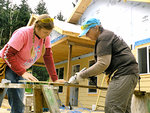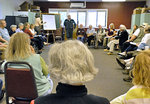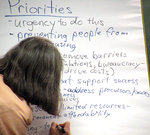Jefferson County community service providers are looking west to see what Clallam County has done with affordable housing.
They want to follow suit.
In Clallam County, 140 new units of …
This item is available in full to subscribers.
We have recently launched a new and improved website. To continue reading, you will need to either log into your subscriber account, or purchase a new subscription.
If you had an active account on our previous website, then you have an account here. Simply reset your password to regain access to your account.
If you did not have an account on our previous website, but are a current print subscriber, click here to set up your website account.
Otherwise, click here to view your options for subscribing.
* Having trouble? Call our circulation department at 360-385-2900, or email our support.
Please log in to continue |
|




Jefferson County community service providers are looking west to see what Clallam County has done with affordable housing.
They want to follow suit.
In Clallam County, 140 new units of affordable housing were created in the last three years.
In Jefferson County, over the last three years, Habitat for Humanity of East Jefferson County created 10 new affordable housing units. Olympic Community Action Programs (OlyCAP) sold two homes that had been in the affordable-home inventory.
And that’s all anyone really knows about the creation of new affordable homes here.
“We’re behind what the need is, and I think everyone recognizes we can solve this if we can work together,” said Jamie Maciejewski, executive director of Habitat for Humanity of East Jefferson County. “I’m pretty inspired by what Clallam has done.”
NEW EFFORT STARTS
A new group is forming to address housing issues in Jefferson County, now that Jefferson County and the City of Port Townsend have disbanded the Housing Action Plan Network (HAPN), a committee that was created in 2006 to come up with a plan to address the lack of affordable housing.
More than two dozen people, including city and county officials and representatives of a half-dozen community nonprofit agencies, met on June 26 at the Tri-Area Community Center to talk about housing needs.
And they all agreed to meet again, at 4 p.m. on Wednesday, July 24, to continue the discussion.
Peninsula Housing Authority executive director Pam Tietz led that first 90-minute discussion about issues facing Jefferson County as well as funding issues faced by agencies everywhere.
Ultimately, she said, “The funding around affordable housing is challenging right now, just like every other budget is … but that doesn’t mean they are impossible.
“So when you are going after funding for affordable housing, it’s critical that you are partnering.”
City of Port Townsend senior planner Judy Surber, who had been the city official working on housing issues, explained how HAPN started in 2006 and how it was disbanded recently because of staffing issues.
Both city and county officials say the challenge of creating affordable housing was passed on to Peninsula Housing Authority, the new name of a regional authority that is to serve both Jefferson and Clallam counties.
“At this time, the city and the county are confident that we have the expertise [in Peninsula Housing Authority] and that we can start backing off,” Surber said, noting that neither the city nor the county have the expertise in actually building housing.
“The city’s role in meeting affordable housing lies in the planning, infrastructure and economic development realm, rather than the actual construction of units,” Surber said after the meeting. “Construction is what our partners do.”
Surber said HAPN was able to help Dove House Advocacy Services obtain a housing grant for victims of domestic violence. Jefferson County forgave a grant that the former Jefferson County Housing Authority had. That agency later was taken over by Clallam County Housing Authority, which then became Peninsula Housing Authority.
The city and the county also inventoried properties that could be used for housing. Additionally, the city helped Habitat for Humanity of East Jefferson County by waiving some fees, which saved the nonprofit more than $20,000.
NO NEW UNITS
Despite six years of study and 42 identified actions, it’s hard to tell whether many affordable homes, other than Habitat for Humanity’s homes, have been built in Jefferson County in the last six years.
And Section 8 vouchers, which are used to help low-income people pay rent on existing homes, are no longer available in Jefferson County.
“We have a five-year waiting list and some 160 [people] on it,” said Carolyn Stimbert of Peninsula Housing Authority.
“I can’t put any more on [the list], because I can’t issue any more vouchers. I have no idea when it’s going to be possible to issue any more vouchers,” she said.
“To me, it’s a crisis.”
That said, Stimbert noted that Peninsula Housing Authority, which built 62 homes in the Port Angeles area with the Mutual Self-Help Housing Loan Program, is looking to do the same in Jefferson County.
The first seven to nine homes could be built in Jefferson County starting in 2014. Much like Habitat’s program, the Mutual Self-Help Housing Loan program requires sweat equity, with prospective homeowners helping build all the houses in their neighborhood. (See sidebar.)
HOUSING FIRST
Building houses, as Clallam has done, is what needs to happen in Jefferson County, Tiez said.
Tietz told the group on June 26 that over the past few years, the federal government has changed the way it looks at homelessness and the way it funds housing programs.
“What they are really interested in doing is using a housing-first model,” she said. What that means is that there is less money for emergency shelters and transitional housing, and more money available for permanent housing, such as those Mutual Self-Help homes for which she’s looking for land on which to build in Jefferson County.
While Clallam County had an infrastructure of emergency and transitional housing, Jefferson County doesn’t have enough of a supply of either and so “now there’s no funding for that, and we have to figure out how to get around that,” said Tietz.
Maciejewski of Habitat for Humanity East Jefferson County, Surber of the City of Port Townsend, and Geoff Crump, executive director of Olympic Community Action Programs (OlyCAP), agreed with Tietz that a coordinated approach between social service agencies is what needs to happen.
“It takes coordination between many stakeholders to get anything off the ground,” said Surber.
“What we haven’t seen in our county is new preservation and new development, and we know we still have people who fall within the income guidelines for needing affordable housing,” Crump said.
OlyCAP sold two houses that had been in the inventory of affordable housing units, because the houses – for people with mental health issues – did not pencil out financially. OlyCAP was able to keep a home on Lawrence Street in its inventory.
Tietz, for one, is confident that something can happen.
“I know that if we do this as a group, and we have a road map in front of us, we will be successful,” Tietz told the group.
PRIORITIES, SERVICES
The group was asked to share ideas for priorities, and those ideas were varied.
One man said he had talked to a number of people who were in danger of losing their homes and he felt that was an urgent issue.
Developer Jim McCarron said it was important to identify and remove barriers that obstruct the construction of affordable housing, and he suggested many of those barriers were related to rules put up by bureaucrats, in particular, planners.
Surber, a city planner, cautioned that rules were enacted for a reason: They are there to ensure, for example, that septic systems don’t fail.
And Dove House executive director Beulah Kingsolver pointed out that people can’t go from being homeless to having a home without also having services to ensure their success.
Kingsolver also noted that it took four to five years for one of the women who had gone through Dove House to finally be in a decent home.
“It takes more than 90 days … and a lot of services,” Kingsolver said, echoing the calls from others to work together to help people in need.
DeForest Walker, who has worked with the Winter Shelter program in Port Townsend for years, suggested that there were people in Jefferson County who didn’t understand the magnitude of the housing problem, which is more than just about homelessness and affordable housing.
She urged the group to share with the community at large some of the “gritty examples” of the kinds of housing people were in.
“Shelter is a basic human right. Everybody in our community doesn’t recognize it,” she said.
Ultimately, Walker said, finding housing for people is a savings for the entire community.
“The savings is in the following big-ticket items: hospital, law enforcement, ambulance, jail costs. All of these go down. It’s healthier; people are safer.”